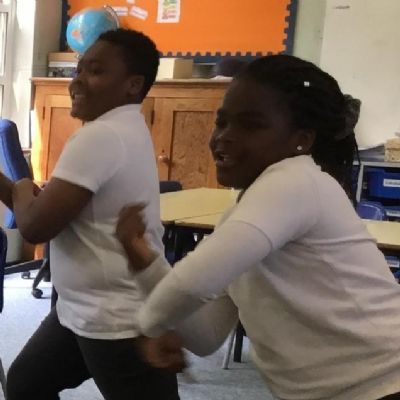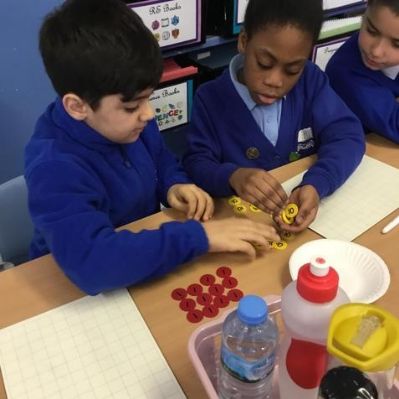Mathematics
Our Aim:
By Year 6, we want every child at Galliard to be confident and enthusiastic mathematicians who leave our school with solid foundations on which to base the rest of their mathematical journey.
We have the highest of expectations for all of our children from Nursery to Year 6 and we give them the tools to achieve through an engaging maths curriculum that fosters fluency, flexibility and the ability to recall and apply knowledge to different situations and problems.
We encourage perseverance and curiosity in maths and teach the children to understand the value of making mistakes in deepening their understanding of mathematical concepts.
How we Teach Maths:
At Galliard, we follow a mastery-based curriculum and ensure that a deep understanding of maths is achieved through:
- Breaking concepts down into small and coherent steps
- Carefully selecting representations (concrete or visual) to expose structure
- Prioritising the embedding of concepts and procedures and helping children to commit these to long term memory
- Emphasising efficient and accurate recall of key number facts in order to free up working memory to grasp more advanced concepts
- Exploring patterns, relationships and connections
- Modelling and encouraging the use of precise mathematical language
Our maths curriculum follows the progression set out by White Rose and teachers adapting the scheme to meet the needs of our children. We also use the NCETM Curriculum Prioritisation materials to support with the planning and teaching of maths at Galliard.
In our teaching, we follow a Concrete – Pictorial – Abstract method to allow children to internalise new concepts being taught. The use of physical and visual representations deepens children’s understanding by enabling them to see the maths and make sense of what is happening. Lower down the school, children are exposed to a huge variety of carefully selected resources with an emphasis on numicon, dienes and tens frames. Later on, resources and visuals are used to demonstrate and embed concepts in a way that exposes the structures of the maths being taught and helps children give meaning to and understand different processes.
Reasoning is a feature of every maths lesson and children are given lots of opportunities to discuss and explain their thinking, using correct mathematical language and full sentences.
We have a strong emphasis on fluency skills throughout the school with daily practice in order to ensure frequent repetition and revisiting of concepts. All classes from Year 1 to 6 also do daily short bursts to help with recall of key facts.
Progression in Years 1-6:
Our maths curriculum follows the progression set out by White Rose to ensure coverage of the National Curriculum – see progression document here. Click here for year 1-6 White Rose and National Curriculum document. Teachers adapt the scheme in order to meet the needs of our children. We also use the NCETM Curriculum Prioritisation materials to support with the planning and teaching of maths at Galliard.
Find details of termly progression relevant to your child’s year group below:
Click here for Year 1 small steps
Click here for Year 2 small steps
Click here for Year 3 small steps
Click here for Year4 small steps
Click here for Year 5 small steps
Click here for Year 6 small steps
Times Tables:
Effective understanding and recall of times tables is the foundation of much of the mathematics children will do. Teachers teach times tables in class and enthuse the children in the learning of these crucial facts through use of games and energisers.
Children from Year 3 have access to Times Tables Rock Stars. They can use this programme completely independently to practise times tables that have been allocated to them by their class teacher. Playing on Times Tables Rock Stars regularly is a fantastic way for children to increase their accuracy and fluency. Children compete against each other in a half termly challenge in which the classes with the most children taking part each week gain points for their class on the leader board.
Home Learning:
Lower down in the school, homework is geared towards the accurate recall of basic number facts to help develop fluency in children. Families are also encouraged to watch Numberblocks at home and take part daily in the White Rose 1-Minute Maths app to help build greater confidence with number.
The children in Key stage 2 are set homework using the programme My Maths. Home learning aims to provide children the opportunity to revisit and embed the learning they have been doing in school. In addition to this, children are expected to practise their times tables at home, either through a task set by their teacher, with their families or by using Times Tables Rock Stars.
During the year, we invite parents to maths workshops in which they experience some of the work children do in lessons. In particular, we want to clarify the methods used in class by the teachers as often it is not how they themselves were taught in school. We also provide parents with lots of ideas of activities they can do with their child at home to help develop their mathematical fluency.
Useful websites:
https://mathsframe.co.uk/ (times tables practice)
https://whiterosemaths.com/resources/1-minute-maths
https://www.bbc.co.uk/iplayer/episodes/b08bzfnh/numberblocks
https://www.topmarks.co.uk/maths-games/hit-the-button (interactive arithmetic games)
Click here for our maths progression documents
Times Tables Rockstars Guinness World Records Challenege
Our Maths group took part in an official Guinness World Record attempt to beat the most number of viewers on a live stream on YouTube. Baz Wynter from Times Table Rockstars danced to a times table rap and we all joined in. The previous record was 1500 viewers but this record was broken and there were 5362 viewers. It’s amazing that we were able to be a part of this Guinness World Record. After this, we learnt the 8 times table rap and performed it. Why don’t you have a go too?
Below are Powerpoint Presentations from the Year 4 and 5 Multiplication workshops
Below are some of the resources from the workshop:
Here are some useful Maths resources from the workshop:












